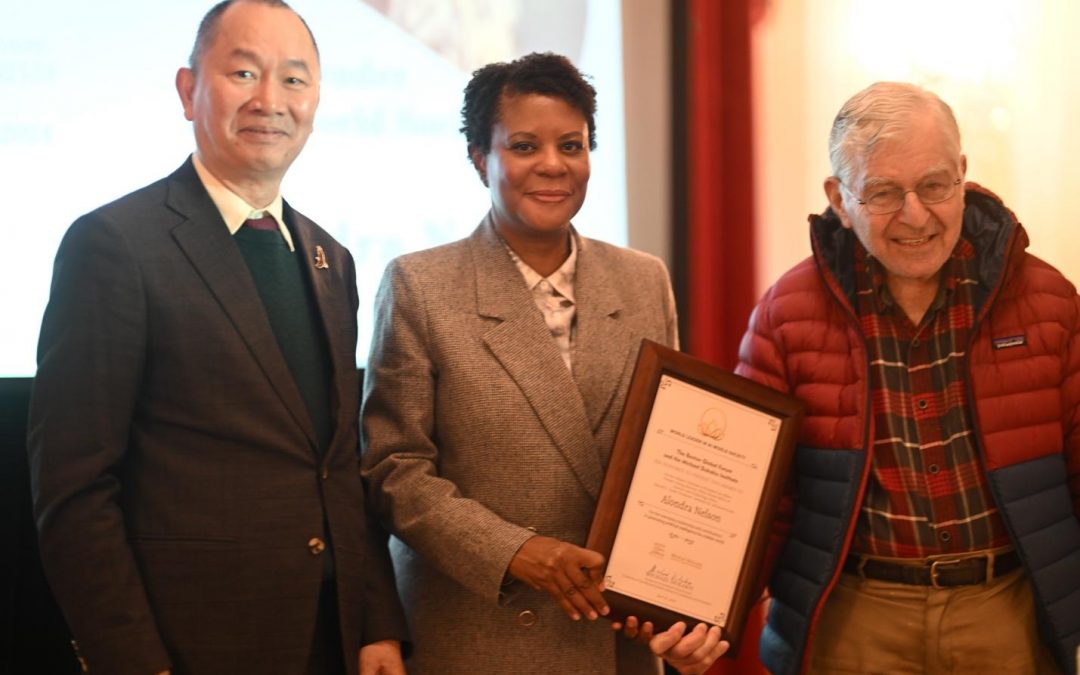
by Editor | May 6, 2024 | News, World Leaders in AIWS Award Updates
The BGF honored Dr. Alondra Nelson with the 2024 World Leader in AIWS Award for her leadership in AI governance and policymaking at the conference “Governing the Future: AI, Democracy, and Humanity” on April 30, 2024. Governor Michael Dukakis, Chair of Boston Global Forum, and Nguyen Anh Tuan, Co-chair and CEO of Boston Global Forum, presented her with the award in the ceremony.
Afterwards, Dr. Nelson delivered an AIWS Distinguished Speech titled “Governing the Future: AI, Public Policy, and Democracy.” Her speech delved into the vision of AI governance with emphasis on democratic participation and policy innovation – so that democratic principles are upheld during the paradigm shift, but technology and the sciences can thrive too. She emphasized:
- The benefits of AI are not inevitable; they are not inherent properties of the technology. Rather, any potential beneficial uses of AI tools and systems must be stewarded through innovative AI governance including regulations, laws, standards, and norms. This is how we govern the future.
- Perhaps counterintuitively, the November 2022 release of ChatGPT was the opening of a democratic opportunity. This was the moment when the public took notice of the perils and possibilities of the growing uses of AI in their lives and, in some powerful instances, such as the SAG-AFTRA and Writers Guild of America strikes, successfully advocated to place guardrails around its use.
Dr. Nelson not only shed light on the challenges and opportunities presented by AI but also inspired attendees to actively engage in shaping the future of AI governance and guide it toward ethical progress for all. Her insights call on both civil society and government to ensure the possibilities AI holds will lead to outcomes beneficial for the public good. It is not a false dilemma of pursuing efficiency versus ensuring equity; and a long-term vision of state-level policymaking and stewardship can help guide AI development toward an ethical and prosperous society.
In addition to her distinguished speech, BGF and its Chief Editor Minh Nguyen had the opportunity to interview Dr. Nelson about her work in AI policymaking and her thoughts on geopolitical trends and areas for cooperation and competition in technology. BGF will publish a special document on the 2024 World Leader in AIWS Award and Conference based on the AIWS Distinguished Speech, interview, and notes from the talks of Ami Fields-Meyer, former Senior Policy Advisor to the White House; MIT professors Alex Sandy Pentland and Nazli Choucri, and BGF CEO Tuan Nguyen.




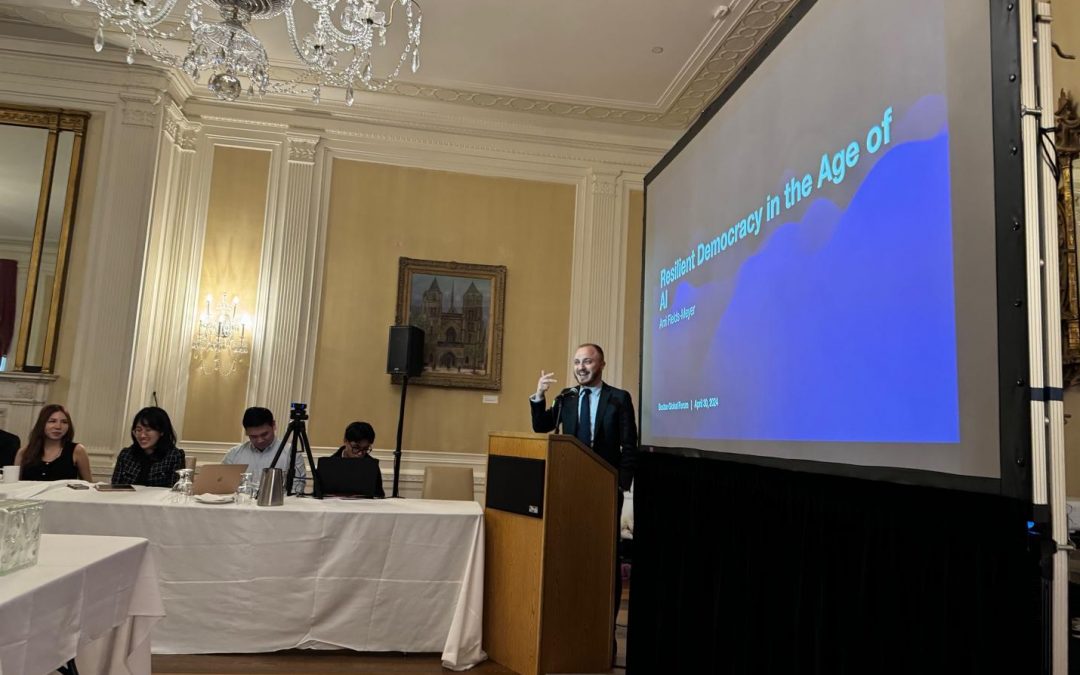
by Editor | May 6, 2024 | Global Alliance for Digital Governance
Ami Fields-Meyer, former Senior Policy Advisor at The White House and the Chief of Staff of Dr. Alondra Nelson during her time leading the Office of Science and Technology Policy, gave an insightful presentation on AI and democratic governance at the BGF Conference “Governing the Future: AI, Democracy, and Humanity.” Focused on “Resilient Democracy in the Age of AI,” he discussed several key ideas that shed light on tensions between AI and current conceptions of democratic governance.
AI = Power: Fields-Meyer emphasized the transformative power of AI, highlighting its potential to reshape societal structures and dynamics, for good or ill. He underscored the notion that AI is not merely a tool but a form of power that can significantly influence various aspects of human life, including political processes.
Algorithmic Discrimination: One of the key concerns raised by Fields-Meyer was the issue of algorithmic discrimination. He delved into how AI systems, if not carefully designed and monitored, can perpetuate biases and discrimination, exacerbating societal inequalities. This topic drew attention to the ethical implications of AI deployment and the need for robust safeguards against discriminatory practices.
Incentives in Conflict: Fields-Meyer explored the inherent conflict between incentives driving AI development and the principles of democracy. He discussed how profit motives and technological advancement can sometimes be at odds with democratic values such as transparency, accountability, and fairness. This conflict highlighted the complexities of navigating AI governance within democratic frameworks.
AI as a Popular Political Issue: Lastly, Fields-Meyer touched upon the prominence of AI in contemporary public discourse. He observed how AI-related topics, including data privacy, surveillance, and automation, have become central themes in political debates worldwide. In fact, this broader societal recognition of AI demonstrates the urgency for AI governance. While these AI systems may be new, it is still within the willpower of society and government to steer its development toward a future that is ethical and fair for all.


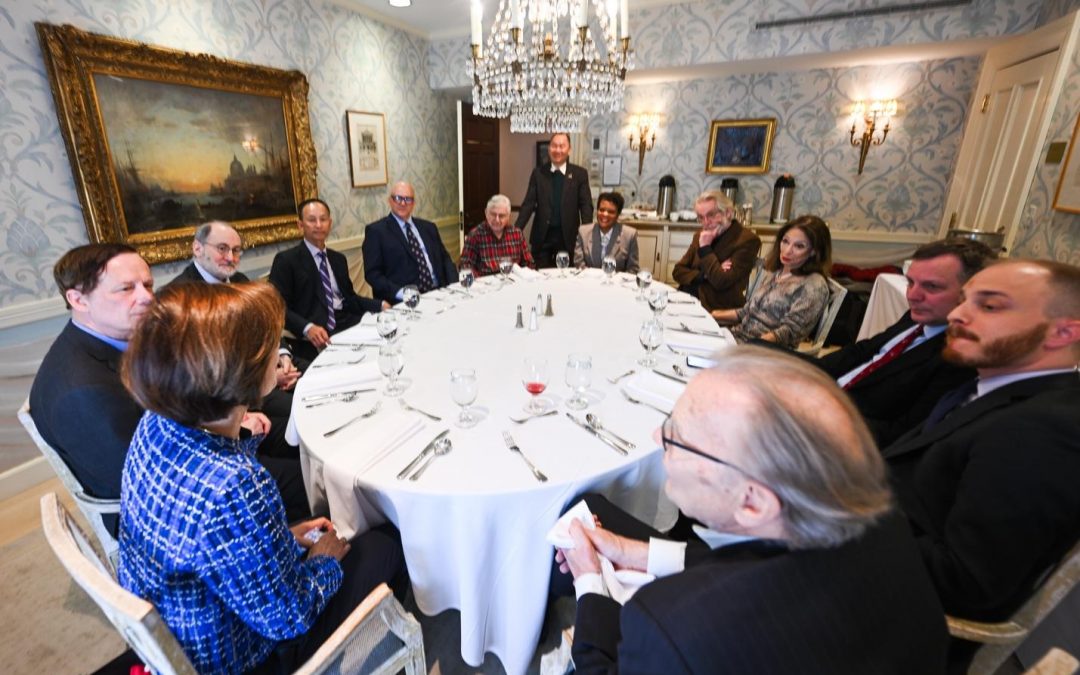
by Editor | May 6, 2024 | News
This is a republication of Horizon Search’s article on LinkedIn.
Horizon Search
Exploring global insights in entrepreneurship, innovation, and leadership.
Published Apr 30, 2024
Generative AI isn’t a threat, but a powerful tool for human-AI collaboration. Boston Global Forum advocates for responsible AI development to unlock its potential for innovation across industries while ensuring ethical practices and human oversight.
Artificial Intelligence is changing the world at a neck-breaking speed. From Washington Street to Silicon Valley, the inception of ChatGPT in late 2022, stirred roundtable discussions centered around the implications of this technology across major institutions. The technology landscape has been brimming with countless AI innovations in the last two and a half years. From easy plagiarism to writing code, the media in 2022 scrutinized tasks a chatbot could perform in a couple of minutes. But now with rapid advancements in technology, the chatter has given way to grave questions related to ethical AI use:
● Will generative AI replace my job and leave me unemployed?
● How can I know what’s real and what’s not in a world of sophisticated algorithms?
● Will critical decisions about my health and well-being be made by machines?
From 2017, Boston Global Forum (BGF) has been among the world’s most innovative think tanks in developing strategies for AI in politics and society. Driven by its core purpose of unlocking the potential of those to advance the world, BGF has contributed many significant pioneering initiatives. Now, BGF is harnessing the combined power of generative AI and human capabilities to drive growth, innovation, and transformation through the Artificial Intelligence World Society Initiative (AIWS). Founded by Governor Michael Dukakis and Nguyen Anh Tuan in November 2017, the AIWS is a means of counteracting the unethical uses of AI by building a 7-layer model for the ‘Age of Global Enlightenment.’
AIWS: Moving Toward Responsible AI Governance
Since 2017, the AIWS initiative, spearheaded by the BGF, has been on a mission to shape responsible AI governance and foster new models of democracy. In a short period, the initiative has achieved the following:
● 2017: The AIWS has launched, setting the stage for global discourse on AI governance.
● 2018: The AIWS Leader Award was established to recognize distinguished leaders in AI for social good. At the BGF-G7 Summit, AIWS unveils the groundbreaking AIWS 7-Layer Model, a roadmap for leveraging AI to enhance democracy and individual rights.
● 2019: The AIWS-G7 Summit initiative introduces the ‘The Next Generation Democracy- AI World Society,’ envisioning a world with AI-powered transparency, inclusivity, and citizen engagement in governance. This has three components: AI-Government, AI-Citizen, and AI Government Index.
● 2020-2022: Expanding Collaboration and Addressing Challenges. A collaboration with Club de Madrid and Boston Global Forum (BGF) leads to the Policy Lab ‘Transatlantic Approaches on Digital Governance.’ This lab underscores the importance of global policies for AI management, governance and announces the social contract for the ‘AI-Age.’ BGF and United Nations co-published the book “Remaking the World – Toward an Age of Global Enlightenment”. There is a special session at the Riga Conference 2021 about this book.
● 2023: The Riga Conference 2023 publishes BGF’s special report “How to Govern AI in an Age of Global Tension.” At the C20-G20 Summit in India in 2023, the recognition of the Social Contract for the AI Age and AI World Society highlighted the global significance of AI governance and the need for international cooperation.
● 2024-Present: The BGF conference honoring Alondra Nelson’s contributions to AI governance stands as a testament to AIWS’s unwavering pursuit of harnessing AI for the greater good and fortifying democratic principles globally and building new democracy.
Deploying Data Sovereignty – Knowledge Platform for AI
Through the AIWS initiative, the Boston Global Forum is seeking to build an AI architecture complementing, not competing with, human strengths. This means AI innovation that leverages human intellect, emotional intelligence (EQ), and cognitive Intelligence (IQ) to achieve desired outcomes.
In this AI-led era of technological advancement, it’s more important than ever for humans to tap into their empathy and lead ethically and with passion as they use AI to advance and improve society in their respective fields of work. Considering this, the Boston Global Forum has conceived “Data Sovereignty – Knowledge Platform for AI”.
As they experiment and innovate with AI, businesses must set in stone the ethical guardrails for using this technology. Generative AI, an amplified and augmented intelligence, is not an alternative to human ingenuity, the BGF believes. In the rapidly evolving landscape of artificial intelligence (AI), the need for a comprehensive knowledge platform has never been more pressing. Furthermore, as AI systems continue to permeate various aspects of our lives, from healthcare and finance to transportation and entertainment, the importance of having a centralized repository of knowledge to inform decision-making processes is paramount. Recognizing this, the Boston Global Forum has conceived the Data Sovereignty – Knowledge Platform for AI. This platform serves as an essential resource, providing a foundation upon which AI applications and systems can reference, think critically, and make informed decisions.
CEO’s Guide to Generative AI Revolution
Much like the first free web browser that changed how humans worked and lived, generative AI can disrupt nearly every industry. A double-edged sword, AI promises both competitive advantage and creative destruction. Either way, a revolution in business-model innovation is coming. How should the C-suite respond? From BGF’s standpoint, the priority for CEOs isn’t to fully immerse themselves in the technology but, instead focus on how generative AI will impact their organizations and industries. They must also zero in on strategic choices they make for the company:
● What innovations become possible when every employee can access the seemingly infinite memory generative AI offers?
● How will this technology change how employees’ roles are defined and how they are managed?
● How do you deal with false or biased output generated by generative AI models?
Building Generative AI Solutions for Healthcare
The healthcare industry is committed to high-quality care for patients but for that, healthcare providers must first go through rigorous documentation tasks. Helios, a leading hospital chain in Germany, had begun working toward a comprehensive digital ambition when its team decided to explore using Generative AI to simplify lengthy documentation. BGF worked with partners to find ways to acquire patient data that doctors would consider before generating a discharge letter from the hospital information system, all of which were previously challenging to retrieve. Recognizing that patient privacy was paramount, BGF developed the proof of concept for the cardiology department in an on-the-premises environment. Based on real patient data and historic discharge letters, BGF fine-tuned two open-source large language models (LLMs) for the specific talk in several iterations, leveraging state-of-the-art data science practices. Through a detailed plan, BGF helped doctors generate discharge letters with a touch of a button-saving hours’ worth of work per day.
Artificial Intelligence: An Unchartered Territory
The emergence of generative AI is a pivotal juncture in human history. With its potential to revolutionize industries and augment human capabilities, industries should not miss the bus on AI innovation. However, responsible stewardship of AI is integral for its ethical and sustainable use.
President of European Commission Ursula von der Leyen highlighted in her speech at the Boston Global Forum Conference on December 12, 2020:
“It is such an honor to be here with you today. At the Boston Global Forum and Michael Dukakis Institute for Leadership and Innovation, you are at the forefront of research and debate. And you definitely work on some of the world’s most pressing issues. You drive the discussion on digital policy and how a human-centric approach on AI could look like. This is an issue whose importance simply cannot be overestimated.”




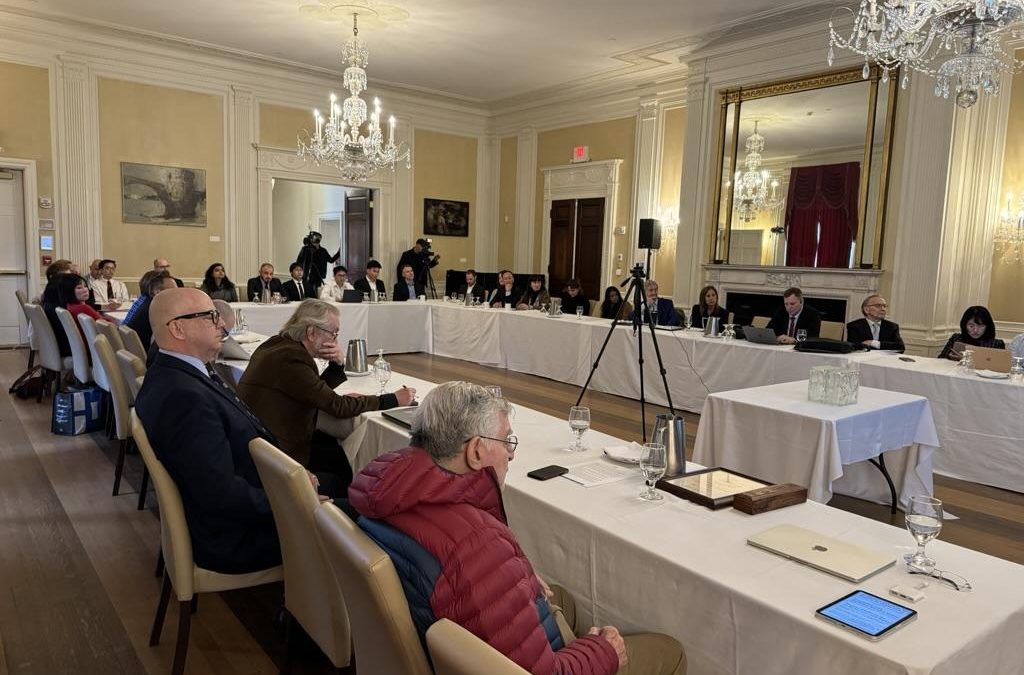
by Editor | May 6, 2024 | News
Yasuhide Nakayama, former State Minister of Defense of Japan, spoke at the BGF Conference “Governing the Future: AI, Democracy, and Humanity,” held on April 30, 2024 at Harvard University Loeb House via video call from Japan. Here are some of his key notes:
**International Cooperation and Leadership**
⭐️The Japanese government is acutely aware of the importance of establishing global governance for AI. When Prime Minister Fumio Kishida participated in the AI Safety Summit hosted by the UK, he highlighted the risks and potential of cutting-edge AI technologies, including generative AI. We have initiated the “Hiroshima AI Process” through the G7 Hiroshima Summit, leading the creation of international rules, which includes the “Hiroshima Process International Guidelines” and the “Hiroshima Process International Code of Conduct.”
**Domestic Policy and Strategy**
The Japanese government is actively engaged in addressing AI risks, promoting its use, and enhancing development capabilities through the Cabinet Office and relevant ministries. Our initiatives include the phased implementation of generative AI, enhancing skills education across all generations, boosting research capabilities, and supporting startups.
**Future Approaches to Collaboration with AIWS**
The AI World Society (AIWS), part of the Boston Global Forum, contributes significantly to the development of global AI policies. We are looking forward to proposing concrete collaboration initiatives with AIWS in the future, hoping that this will lay the foundation for a mutually beneficial relationship.
**International Safety and Collaboration**
The Japanese government prioritizes collaboration with the international community, extending beyond the G7 to engage with countries and private sectors worldwide. The outcomes of the AI Safety Summit and the Hiroshima AI Process complement each other, ensuring that the global community can benefit from AI. We continue to work closely together to make this a reality.
Through these efforts, the Japanese government not only contributes to the safety and benefits of AI globally but also deepens cooperation with the international community and establishes its leadership in technological evolution.
We are committed to building a foundation that manages both the opportunities and risks presented by AI, together with the international community.
And I have a profound aspiration that I have tirelessly worked towards, along with many colleagues, and continue to pursue. It is to establish a new United Nations headquarters for the Asia-Pacific region in Hiroshima.
I firmly believe that Hiroshima is the most appropriate city to discuss peace. Prime Minister Fumio Kishida, who coincidentally hails from Hiroshima, referred to this initiative as the “Hiroshima Process” in light of the G7 Summit held there.
While the United Nations has its main headquarters in New York and a European office in Geneva, as an Asian, I must highlight the scarcity of such platforms in Asia, where the global community can convene and engage in discourse.
Therefore, I propose the establishment of a dedicated UN headquarters in Hiroshima, Asia. Each UN headquarters has its unique mission, and I suggest that this new location focus on Artificial Intelligence, or AI.
Humanity finds convenience in conversing with AI, a form of artificial human, which will likely escalate as we seek to satisfy our curiosity. However, do we know enough about AI to entrust it with such significant roles? This question will increasingly bear down on us as a critical issue. When it becomes crucial to meet and discuss these matters in person, without the mediation of the internet, there will be no substitute for direct human interaction. The importance of face-to-face communication cannot be overstated, and we must prepare for potential risks with imagination and foresight.
Even if some may criticize it as mere infrastructure without immediate return, I believe it is essential to establish a UN Asia-Pacific headquarters in Hiroshima, specifically to address AI.
This would not only serve as a strategic location but also as a symbolic gesture, reinforcing the significance of direct dialogue and cooperation.
Additionally, I am currently responsible for investments in “deep tech” for a fund based in Japan. Our fund is a leading shareholder in Cyabra, the company that Elon Musk used during his Twitter acquisition. As mentioned earlier, we possess deep tech capabilities to detect fake videos and text.
In conclusion, AI might help you find a spouse. However, when it comes to divorce, it won’t be able to shed tears alongside you. We must remember this characteristic and think about AI with creativity and imagination.
I would like to conclude with one last Japanese lesson. It goes without saying that “LOVE” is a very important word in English. So, what is the Japanese word for “LOVE”? In Japanese, it is expressed as “愛” (Ai). We should remember that “愛” (Ai), which means “LOVE” in Japanese, represents one of the most challenging concepts to grasp, both for humans and artificial intelligence.
Thank you very much for your attention.


by Editor | Apr 29, 2024 | News
With the recent American foreign military aid package finally passing Congress and signed by the White House, one of its corollary, the bill to ban TikTok, is regaining traction in public debate. Since the last round of discourse, the positions of both sides have not changed, and neither has this column’s. It is indeed in the best interest of not just the US, but the Four Pillars, to ban TikTok. It is unwise to allow a geopolitical rival to hold the ability to manipulate public opinion, compounded by the reach it has. India, one of the Pillars, has banned the social media app since 2020, and the sky hasn’t fallen down there yet. In fact, it should be suspicious that ByteDance would rather cling onto the app instead of spinning or selling it off – it indicates the worth of the app is not just one of monetary value, but something more social, political, and psychological.
Outside of the TikTok talk, the US, a Pillar, has now begun sending military equipment again to Ukraine, as they should have done (or been able to do) months ago. The UK, a part of the Europe Pillar, has also pledged more aid and equipment. These are all needed aids if Ukraine is to withstand further Russian onslaught and invasion – and if China is ramping up its aid for Russia as reported.

REUTERS/Dado Ruvic/Illustration/File Photo
Minh Nguyen is the Chief Editor of the Boston Global Forum and a Shinzo Abe Initiative Fellow. She writes the Four Pillars column in the BGF Weekly newsletter.
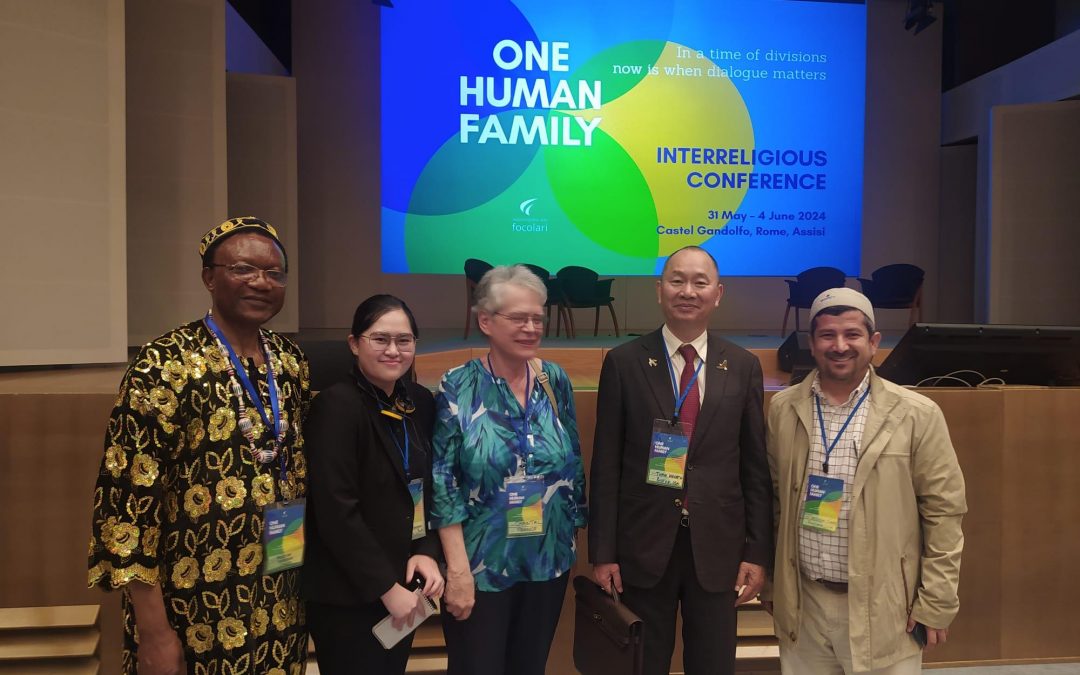
by Editor | Jun 9, 2024 | Papers & Reports, News, Publications
INTERRELIGIOUS CONFERENCE 2024, Rome, Italy May 31 – June 4
Center for Interreligious Dialogue – Focolare Movement
Nguyen Anh Tuan, Nguyen Phan Nguyet Minh
In the rapidly evolving landscape of artificial intelligence (AI), the need for a comprehensive knowledge platform has never been more pressing. As AI systems continue to permeate various aspects of our lives, from healthcare and finance to transportation and entertainment, the importance of having a centralized repository of knowledge to inform decision-making processes is paramount. Due to this necessity, the Boston Global Forum has conceived the Knowledge Platform for AI. This Knowledge Platform can serve as an essential resource, providing a foundation upon which AI applications and systems can reference, think critically, and make informed decisions.
Rooted in ethics and standards, this platform can offer guidance and reference points for individuals navigating the complexities of artificial intelligence. Emphasizing humanity, compassion, and moral judgement, it embodies a commitment to fostering ethical practices and responsible use of AI technologies. By integrating intellectual rigor with ethical considerations, the platform empowers users to make informed decisions that align with ethical principles and societal values, promoting integrity, fairness, and accountability in AI applications across various domains.
At its core, the Knowledge Platform for AI seeks to aggregate and organize vast amounts of data, information, and expertise from diverse sources, both modern and historical. It encompasses the Social Contract for the AI Age, standard values of AI World Society (AIWS), historical data, norms, ethics, and background information from politics, science, and the economy. By consolidating this wealth of information into a single, accessible platform, AI systems can draw upon a wide range of insights to enhance their understanding and decision-making capabilities.
Integration of Spiritual Values from Various Religions into The Knowledge Platform for AI:
A dimension of the Knowledge Platform is incorporating the spiritual values of various and diverse religions into its development, enriching its ethical framework and enhancing its ability to guide decision-making processes. The principles and values of world religious traditions, such as Catholicism, Hinduism, Islam, Buddhism, and Judaism, can contribute to the platform:
Catholicism:
Human Dignity (Dignitatis Humanae): Catholic teachings on human dignity emphasizes the inherent dignity and worth of every human being, regardless of their background or circumstances. Everyone is made in God’s image, and can grow in virtue through their own actions with grace. This value underscores the importance of respecting individual autonomy, privacy, and rights in AI decision-making processes, but also the need to steer individuals toward a moral and ethical path.
Social Justice: Catholic social teaching, first emphasized in the Rerum Novarum, commits to the idea of a just society where the needs of the marginalized and vulnerable are prioritized, that all believers are equal. Integrating this value into the platform ensures that AI systems consider the broader societal implications of their actions and strive to promote equality and brotherhood among humanity.
Hinduism:
Ahimsa (Non-violence): Ahimsa is a central tenet of Hinduism, advocating for non-violence and compassion towards all living beings, as all have a spark of spiritual energy. A prominent practitioner of this principle was Mahatma Gandhi. This value encourages AI systems to prioritize peaceful and non-coercive methods in their interactions with humans, and for AI to not do harm.
Dharma (Virtue, Duty and Righteousness): Dharma emphasizes the importance of fulfilling one’s duty and upholding righteousness in all actions. By integrating this virtue, the platform encourages AI systems to act ethically and responsibly, considering the long-term consequences of their decisions.
Islam:
Justice (Adl): Adl conceptualizes justice within the individual, of having strong morals, integrity and moderation. Incorporating this value into the platform ensures that AI systems uphold principles of fairness and impartiality, treating all individuals with dignity and respect.
Mercy/Beneficient (Rahmah): Rahmah, a Name of God in Islam, is another key value, encouraging compassion and grace towards others. Divine mercy is extended to all of God’s creation. AI systems guided by this value can conceptualize understanding and mercy, leading to more empathetic and humane interactions.
Buddhism:
Selflessness/Compassion (Karuna): Karuna is a quality that needs to be honed on the path to enlightenment. By practicing this value, one can be more willing to let go of mortal hostilities and sorrows. This value encourages AI systems to prioritize the well-being of individuals and communities, promoting awareness and altruism in their decision-making processes.
Wisdom (Prajna): Wisdom, or more specifically insight or gained intuition, is key in Buddhism, as it is the ability to meditate and reflect on the nature of being or phenomena. Integrating this value into the platform ensures that AI systems make informed and judicious decisions that consider the broader implications and consequences.
Judaism:
Tikkun Olam (Repairing the World): This concept classically called for the maintenance of order and jurisdiction, but it has now been interpreted and expanded to the pursuit of social justice and righteousness, that Jews had a duty to both their individual/spiritual welfare and the welfare of society at large. Incorporating this value into the platform encourages AI systems to contribute positively to societal well-being and address pressing issues facing humanity.
Laws/Principles (Halakha): The Halakha refers to the body of religious laws, commandments, and traditions of Judaism. Through the lens of this Judaic tradition, which promotes ethical systems and guidance for the lives of believers, AI systems can be guided by ethical considerations that prioritize integrity, honesty, and accountability.
By embracing the spiritual values of these diverse religious traditions, The Knowledge Platform for AI becomes a more holistic and moral resource, capable of guiding AI decision-making processes in a manner that upholds ethical standards and respects human values.
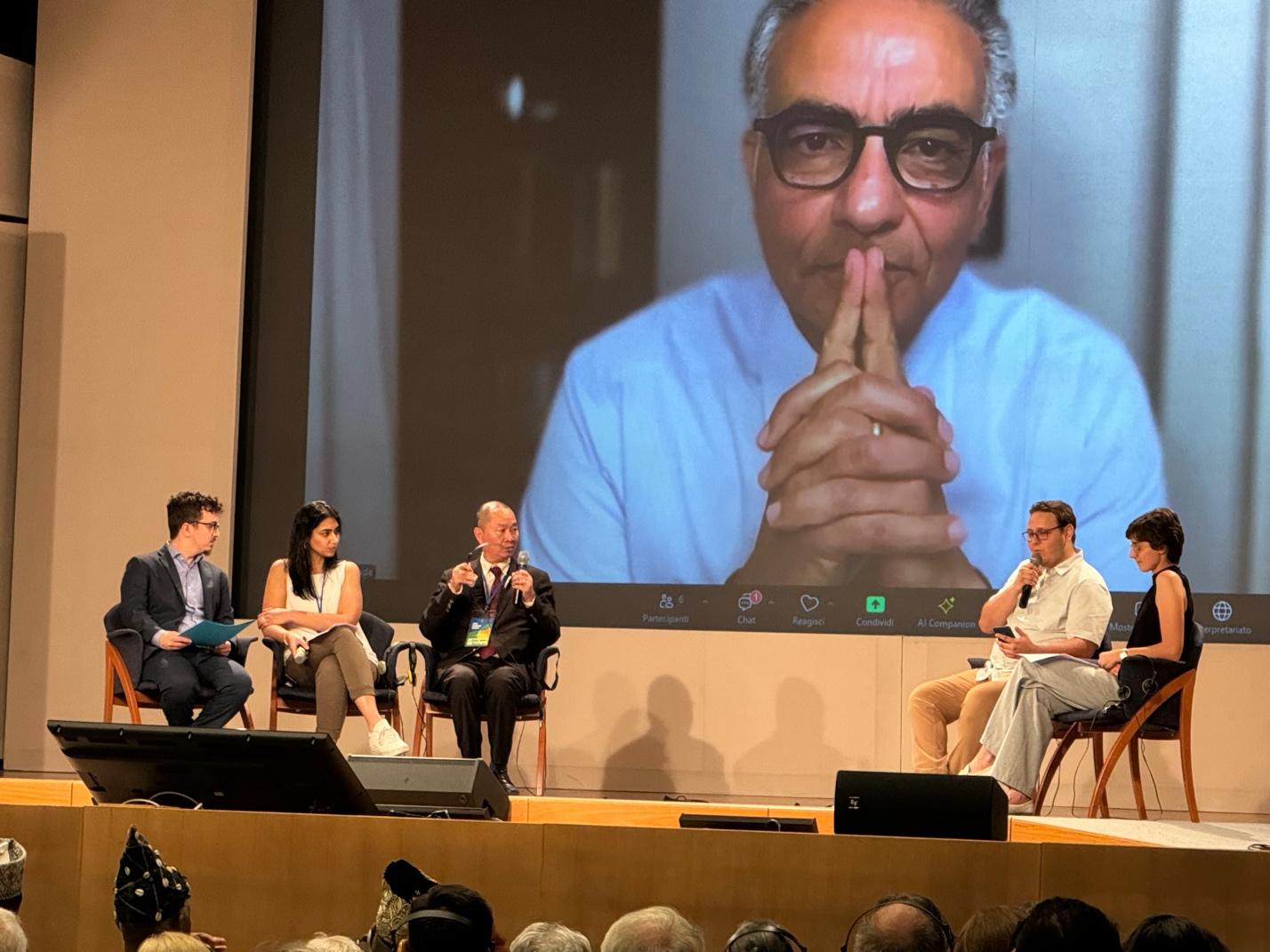

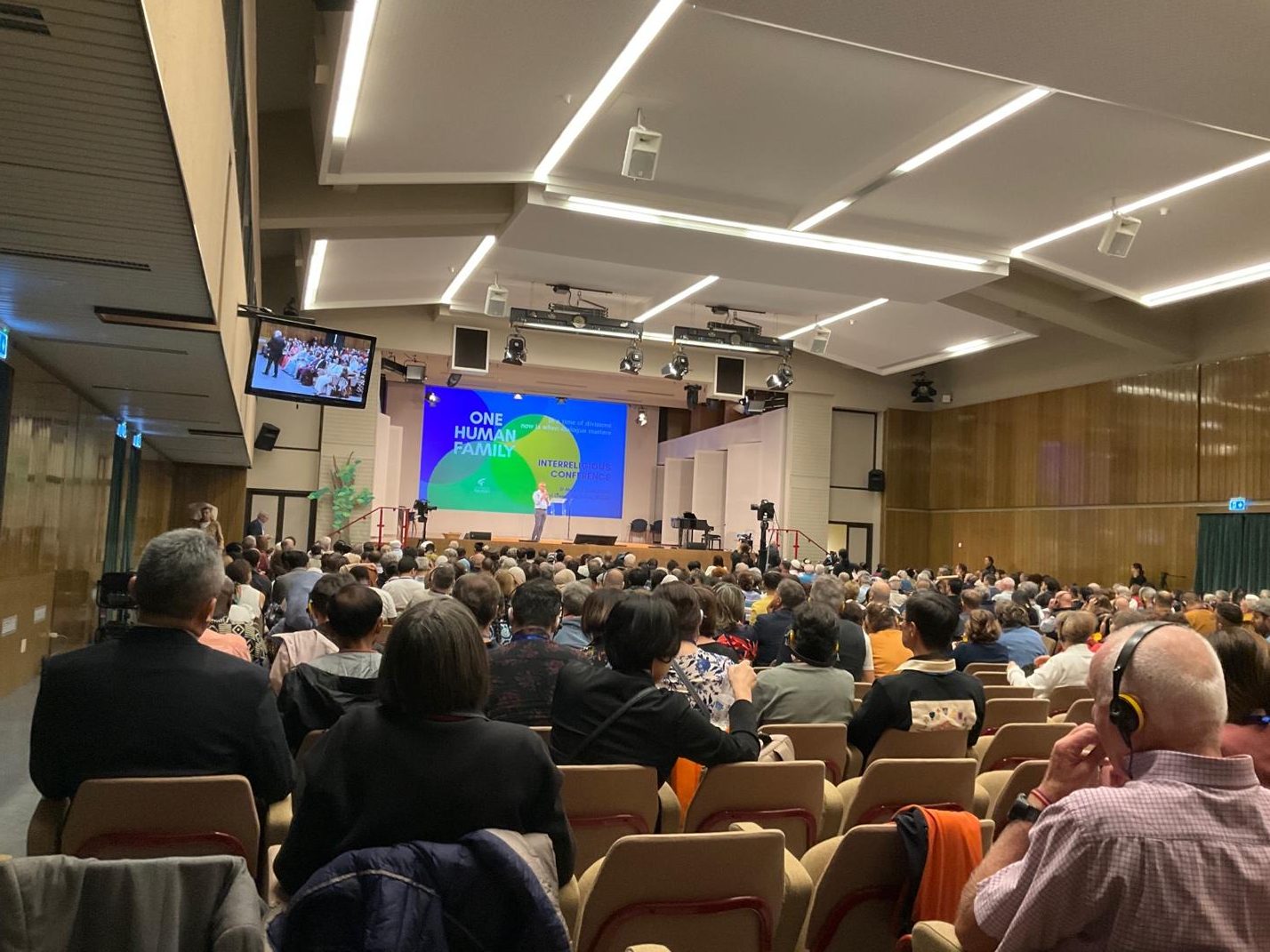
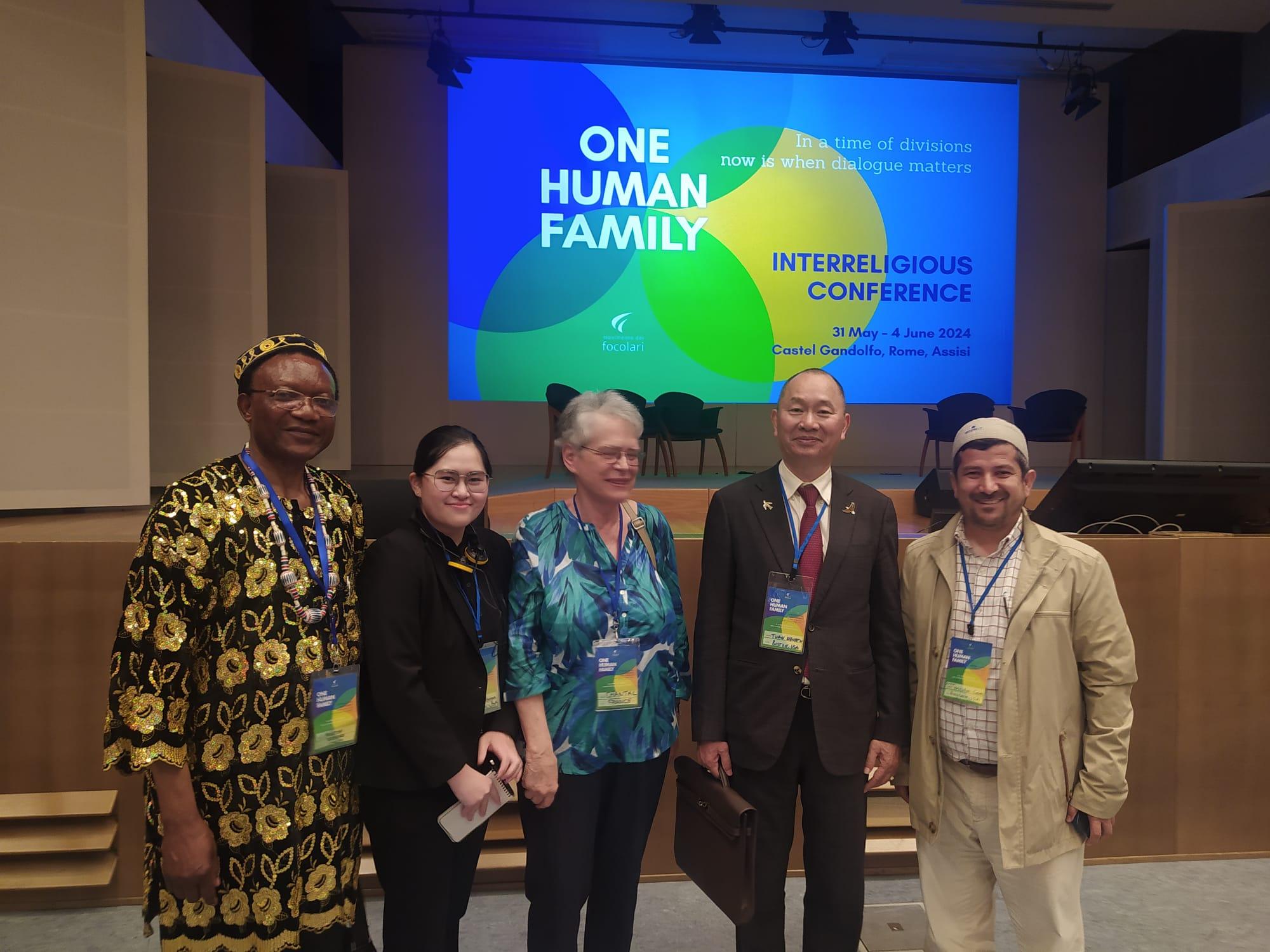
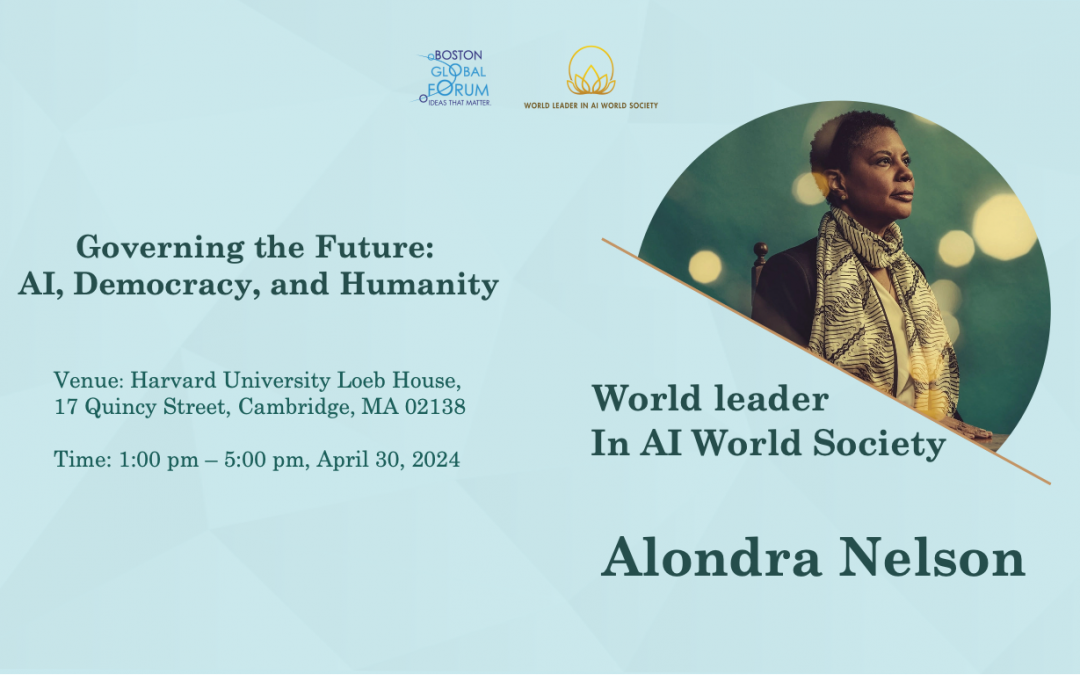
by Editor | Apr 28, 2024 | Event Updates, News
Dr. Alondra Nelson, the former Deputy Assistant to President Joe Biden and Acting Director of the White House Office of Science and Technology Policy, will receive the 2024 World Leader in AI World Society Award and present the AIWS Distinguished Speech at Harvard University Loeb House during the BGF Conference “Governing the Future: AI, Democracy, and Humanity” 1:00 pm – 5:00 pm, April 30, 2024.



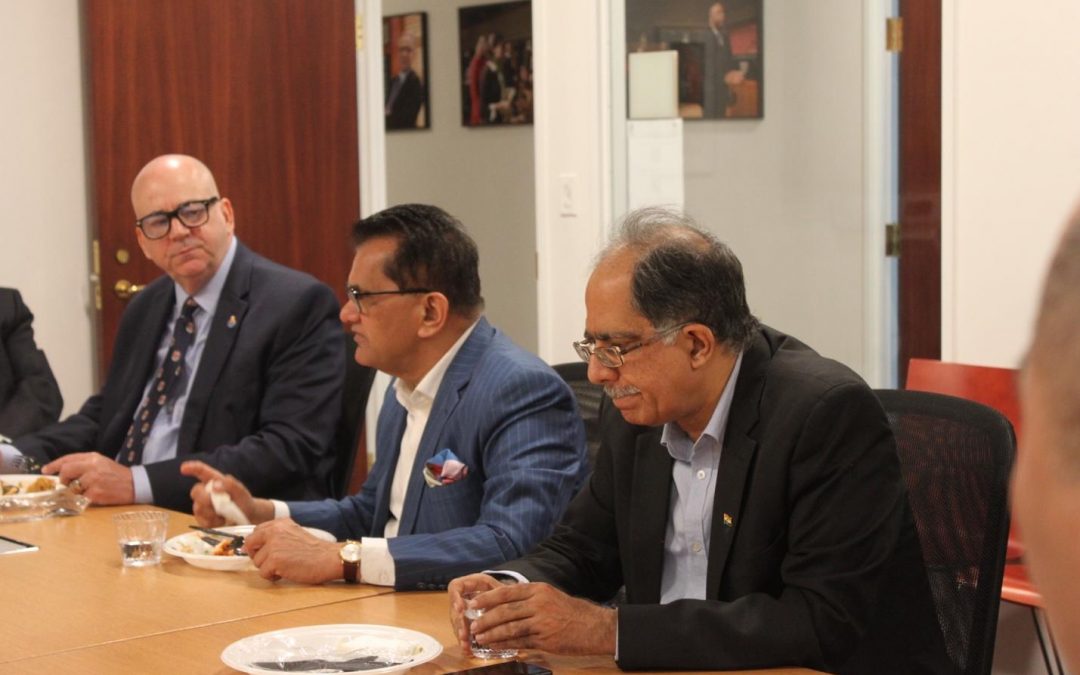
by Editor | Apr 28, 2024 | Global Alliance for Digital Governance
Below is a photo collection of the BGF Roundtable on April 23, 2024 at the Shorenstein Center on Media, Politics, and Public Policy. Participants spoke and discussed Citizen Stack, and potential innovations India could bring to the world, with methods learned from the institutions of Harvard and MIT. They also discussed potential collaborations between the BGF and Citizen Stack, and how the processes of Citizen Stack can be applied to the Knowledge Platform.









by Editor | Apr 28, 2024 | News
Ladies and gentlemen, distinguished guests,
It is with great pleasure and honor that I stand before you today to celebrate the remarkable contributions of Dr. Alondra Nelson as she receives the prestigious 2024 World Leader in AI World Society Award.
Dr. Nelson’s illustrious career is a testament to her unwavering commitment to advancing public policy, governance of artificial intelligence, and our understanding of the societal dimensions of AI development and deployment. As the former Deputy Assistant to President Joe Biden and Acting Director of the White House Office of Science and Technology Policy, Dr. Nelson has played a pivotal role in shaping the landscape of AI governance and policy.
Her leadership at the OSTP led to the development of the groundbreaking “Blueprint for an AI Bill of Rights,” a significant milestone that has been integrated into federal policy under President Biden’s executive order. Dr. Nelson’s efforts have also been instrumental in expanding taxpayer access to federally funded research, advancing evidence-based policymaking, and championing equity and excellence in STEM fields.
Dr. Nelson’s achievements are well recognized and speak volumes about her impact on the global stage. Identified by Nature as one of the top 10 influencers in science and named to the TIME100 list of the most influential people in AI, her dedication and expertise have garnered international acclaim. Additionally, her nomination by the Biden-Harris administration and appointment to the UN High-Level Advisory Board on AI by Secretary-General António Guterres, highlights her pivotal role in shaping global AI governance.
Today, we gather to honor Dr. Nelson’s extraordinary contributions to society and to express our profound gratitude for her tireless efforts in advancing civil and human rights, democratic freedoms, and responsible AI practice. Her unwavering dedication exemplifies the core principles of the AI World Society initiative, and her vision continues to inspire us all as we navigate the complexities of the AI age.
In addition, I am pleased to note the Boston Global Forum’s pioneering efforts in AI governance since 2017 through the AI World Society Initiative. From its inception, BGF has been at the forefront of advocating for responsible and ethical AI development, striving to ensure that the benefits of AI are equitably distributed for all and that its potential risks are mitigated.
As Chair of Boston Global Forum, I am particularly gratified to witness the realization of BGF’s recommendations in AI governance. The impact of our collective efforts underscores the importance of collaboration and shared vision as we work through the challenges of the AI Age.
BGF’s commitment to advancing AI governance continues to strive for positive change and shape the future of technology policy on a global scale.
Dr. Nelson, on behalf of the Boston Global Forum and all those gathered here today, I extend my heartfelt congratulations to you. Your achievements are a beacon of hope for a future where technology serves the betterment of humanity. We are privileged to recognize your outstanding contributions and look forward to the continued impact of your work.
Thank you.





































